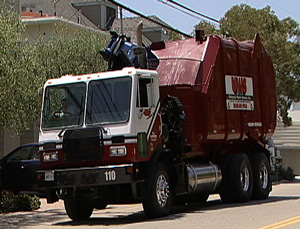
Thousands of apartment building owners in the city of Los Angeles could be slammed by higher trash collection bills under a city proposal now in the works to set up a franchise system for waste haulers.
The franchise proposal, which could take effect in two years, might also force dozens of small waste haulers to seek work elsewhere or shut their doors.
What’s more, pressure is building to include tens of thousands of commercial buildings in the franchise system.
The city proposal, backed by union and environmental interests, is not yet in formal draft form. But it already is stirring concern among local business groups, apartment owner associations and commercial building owner groups, all of which say a franchise system could raise costs on building owners and tenants while reducing service quality. Plans for the franchise system have been discussed during meetings organized by the Bureau of Sanitation. Waste haulers, property owners, environmental groups and labor representatives attended.
Waste haulers, especially small family-run operators who fear losing their existing contracts if they don’t get one of the new franchises, are especially concerned. One of these haulers, A&B Recycling Disposal, has four employees and primarily serves one major apartment complex.
Owner George Nazaroff said he is concerned about what would happen to his business, founded in 1958, if he doesn’t win a city franchise.
“All I want to do is to haul this one major job. I’m happy with them and they are happy with me,” Nazaroff said. “But if I don’t win the franchise, I’m effectively out of business. It’s a life-or-death issue with me.”
Opponents are especially concerned about provisions in the draft proposal to divide the city into six zones with separate franchises for each. They’re also worried about recycling mandates.
“The city is putting itself in jeopardy of creating monopolies that will lead to higher trash costs,” Stuart Waldman, chief executive of the Sherman Oaks-based Valley Industry and Commerce Association, wrote in a recent op-ed in the Los Angeles Daily News.
Landlords say they are concerned that a franchise system would limit competition and force up rates.
“If this franchise system goes into effect, I’m looking at an increase of up to 30 percent in my total trash fees,” said John Jones, chief executive of Greystone Management Group, an L.A.-based apartment operator that owns about 1,000 units in 15 buildings in the city.
Jones said that trash fees on his company’s buildings in Inglewood and Hawthorne, which have franchise systems for trash collection, are roughly 20 percent higher than in Los Angeles.
Currently, owners of apartment and commercial building in Los Angeles are free to choose from among dozens of waste haulers. Owners of multiple properties can have one hauler service all their buildings and use their leverage to get favorable rates.
To obtain a city permit, waste haulers must agree to pay a fee of 10 percent of their gross receipts generated in the city. A total of 130 haulers operate in the city, with 28 permitted to collect waste from apartment buildings.
An earlier attempt to implement a franchise system for waste haulers a decade ago collapsed amid opposition from waste haulers and the business community.
Franchise proponents have formed a coalition called Don’t Waste L.A. The group includes the Los Angeles Alliance for a New Economy, the Los Angeles County Federation of Labor, the regional chapter of the Sierra Club, and other local unions and environmental groups.
They say the current system results in uneven rates and service quality, as well as a lack of safety standards for trash collection workers. They also claim that a handful of major haulers dominate local trash collection, relegating others to small niche markets.
Backers of the franchise system say it would impose standards to guarantee minimum levels of service, bring in more revenue for the city and make it easier to enforce recycling mandates for apartment building owners. They note that 55 of the county’s 88 cities have franchise systems.
‘Protect ratepayers’
“The few companies that dominate the Los Angeles market now don’t have any standards to meet or to protect ratepayers,” said Greg Good, director of the Don’t Waste L.A. project at the Los Angeles Alliance for a New Economy. “Our goal is to help the city meet its environmental goals, grant price and service protections for customers, and to create jobs.”
The coalition issued a report in January calling on the city to implement a franchise system for both multifamily and commercial properties. City Councilmen Jose Huizar and Paul Koretz asked to study that possibility. As of now, though, the only proposal under discussion is aimed at multifamily buildings.
Some apartment building owners say they fear they would have to scrap existing long-term contracts with local haulers, pay higher costs for trash pickup, and spend time and money training tenants to recycle. Owners of pre-1978 apartment buildings subject to the city’s rent stabilization ordinance could be particularly hard hit. That ordinance specifically bars them from passing trash collection costs to tenants.
Greystone’s Jones said that several of his L.A. buildings are subject to the rent stabilization ordinance.
“We’ve already seen substantial increases in utilities, insurance and other costs that we cannot pass on to tenants in those buildings,” he said. “A dramatic increase in trash costs could make some of those buildings unsustainable.”
Jones said he’s also concerned about the possibility the city could set up six separate franchise areas with different waste haulers franchised in each area. That would force him to scrap his long-term contract with a single hauler for all his L.A. buildings and divvy it up among several operators.
Another apartment landlord said one of his main concerns was the possibility of recycling mandates.
“My buildings are in low-income areas and I’ve always had problems trying to get my tenants to recycle,” said Harold Greenberg, who owns three apartment buildings in the city. “I would be very concerned about fines for recycling violations.”
